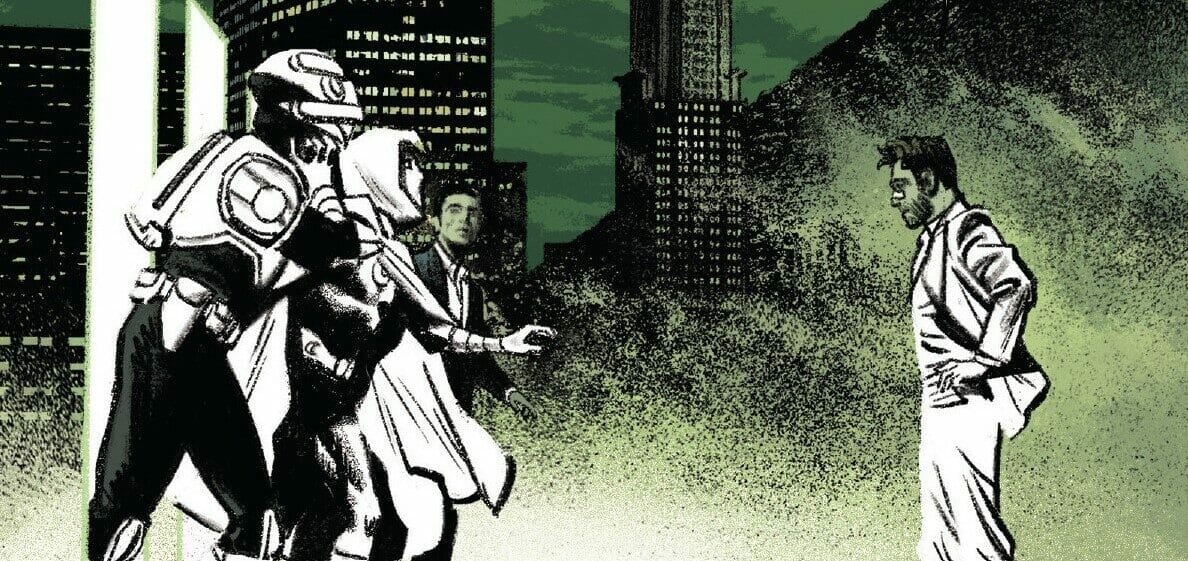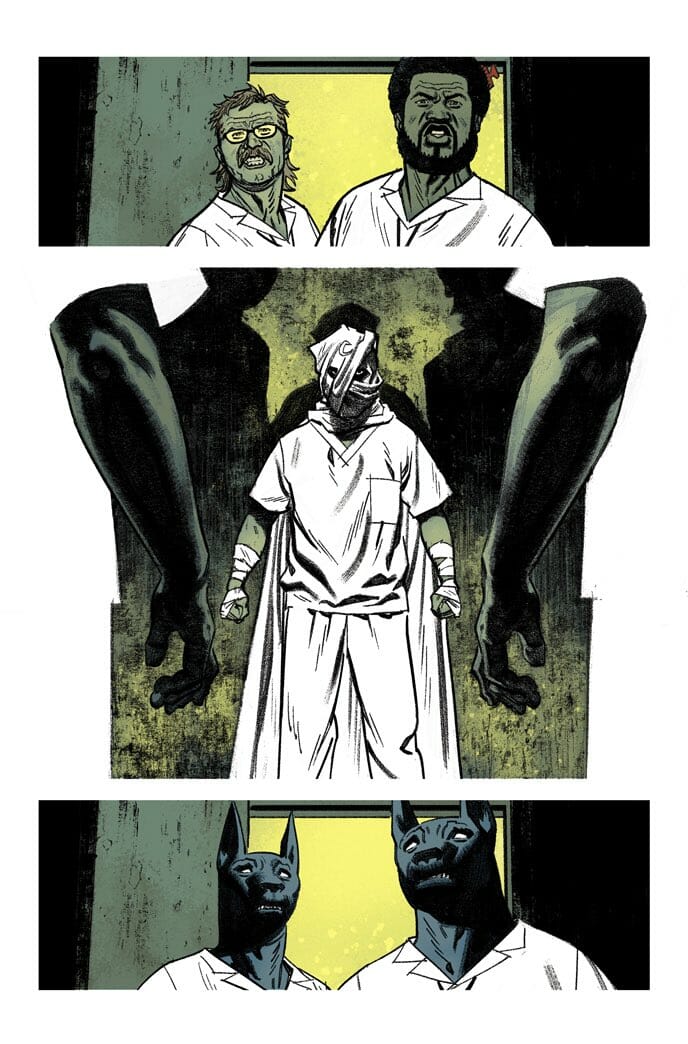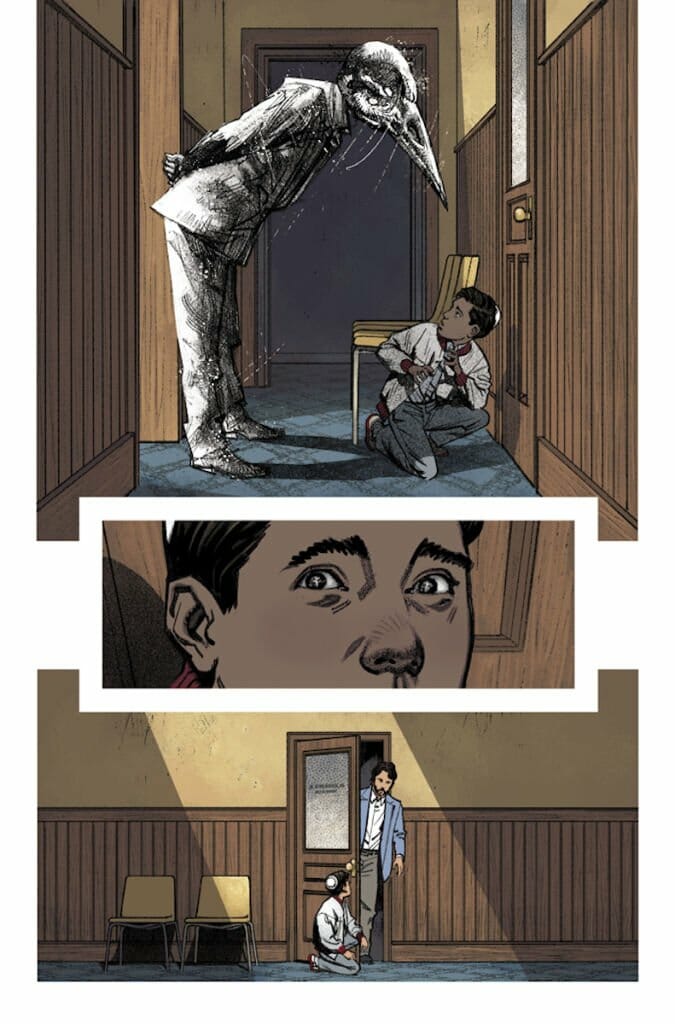
Moon Knight (2016)| A journey into a fractured mind by Jeff Lemire
Year
Format
Length
Dissociative Identity Disorder (DID) is a recurrent topic in Marvel comics, but Jeff Lemire and his Moon Knight stand out for the thorough and clean approach at it. Anticipating what Al Ewing did in his take on the Hulk, Lemire uses Marc Spector and his multiple personalities to dig deep into the metaphorical meanings a superhero story can have. With a more serious approach than the tv show on Disney+, here Moon Knight has to deal with his different personalities and fight a surrogate father in order to have a more solid grasp on his life. (spoiler alert)

Jeff Lemire gives a psychological view of Moon Knight
Marc Spector was once a mercenary, as shown in the iconic first series created by Doug Moench and Bill Sienkiewicz. During a mission in Egypt, he dies and then comes back to life as Moon Knight, the avatar of Khonshu, the Egyptian god of the Moon. At some point, the character was intended to become Marvel’s Batman. Steven Grant, one of Marc’s personalities, is indeed a millionaire playboy and Hollywood producer. Moreover, writer like Warren Ellis employed wonderfully the variety of gadgets and suits Moon Knight has. He didn’t reach the same popularity as his bat-equivalent, but a lot of writers explored the character with a personal touch.
In doing so, Jeff Lemire declares immediately that his Moon Knight is going to be about Marc’s mental illness. After a talk in dreams with Khonshu, he wakes up in a mental institution. The staff is doing its best to keep Marc well sedated. When he protests, a couple of punches become part of the therapy. Throughout the story, Marc will face the attempts of the goddess Ammut to keep him prisoner inside the institution and Khonshu’s harsh exhortations to do what he says. Marc’s actual enemy, though, is himself, and his fragmented personality. Jeff Lemire plays wisely with the features of Moon Knight, sometimes recalling the feeling of disorientation of Mulholland Drive. Combining his ties with the Egyptian gods and his illness, he spreads a cloud of ambiguity. Is it all really happening, is it the trick of some higher entity or is everything inside Marc’s mind?
Whatever the protagonist is facing, it soon becomes clear that he has to come to terms with his mental instability. And the presence of Khonshu within Marc’s inner self, whispering things in his mind, is a big side of the issue.
Overcoming the parental figure
Khonshu is the God of the Moon, protector of night travelers, and he’s usually a benevolent figure. Lemire, though, decided to deliver a shady, darker version of him, with personal aims, concealed by his patronizing attitude. While in Ellis’ episodes Khonshu is a faint and inscrutable figure, here he’s oppressive. He acts like a father who wants to make choices for his “son” Marc, taking advantage of his weak mind.
The author digs deep into Moon Knight’s past, constantly intertwining it with the present events. He reveals that Marc saw Khonsu even when he was a child and blurs the boundaries of their relationship. Has the God made Marc his avatar because of his weak mind or caused this weakness in the first place? The focus of the story is on inner balance. This is why Lemire offers different perspectives on the same scene. The meaning changes based on where the reader decides to move the barycenter.

Whatever the point of view, though, the bond Marc and Khonshu share turn out to be toxic. Khonshu is an authoritarian parent who doesn’t allow his child to be himself and become independent. It can also be seen as a part of Marc’s mind, which prefers to let go instead of facing his difficult condition. The whole story points to the final confrontation with him, which will allow Moon Knight to be reborn as an autonomous individual.
The faces of multiplicity
In maybe the most striking example in Moon Knight’s history, the multiple personalities take life with completely different drawing styles. Artist Greg Smallwood has been accompanied by other three authors in the central part of the series. From the gloomy panels by Francesco Francavilla, to the clean trait of Wilfredo Torres and the pronounced and rich-in-details pencils of James Stokoe, the events almost overlaps, making the reader experience a visual and narrative suggestion of what it means to suffer from DID.
The other episodes illustrated by Smallwood shift from a more rough and unrefined art of the dreamlike scenes to a cleaner trait of the other moments. Together with original ideas of layout and framing, even if in the long run redundant, they all contribute to the feeling of uncertainty of the series. This Moon Knight lacks the witty and varied visual inspiration of the one by Ellis and Declan Shalvey. However, Lemire and Smallwood try to make the page something more than just a blank space filled with images. Following the lesson of Promethea and Sandman: Overture art by J.H. Williams III, as well as David Aja’s Hawkeye, the page sometimes speaks for itself.

A new beginning
To be actually able to face Khonshu, Marc has to make peace with himself first. The central part of the story is dedicated to an exploration of all of Marc’s identities: millionaire Steven Grant, cab driver Jake Lockley and also a new Marc, who fights aliens in space. The fact they are so divergent from each other stands for Marc’s incapacity to deal with his illness. Every identity is a way to escape from it, but they will all eventually converge in the same place. Accepting all of them will be the way Marc accepts what he is, understanding that this condition is part of him. With this clear in mind, it also becomes possible to overcome the oppressive demands of Khonshu and break his spell of subjugation.
Tag
Buy a ☕ for Hypercritic









